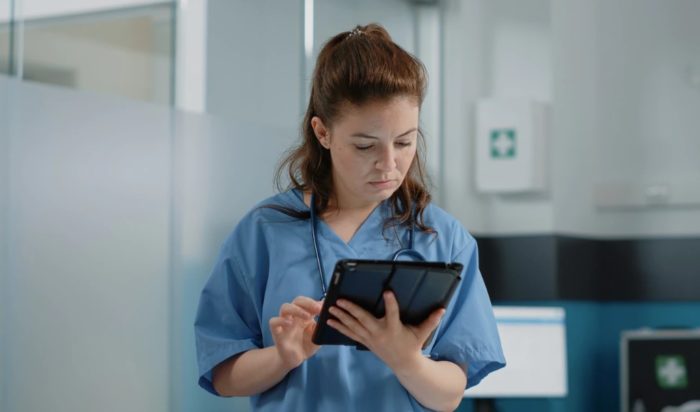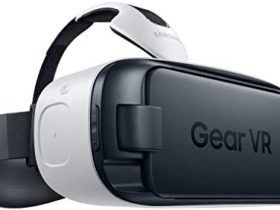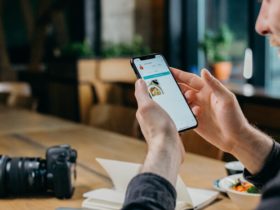It’s no secret that the United States healthcare system is suffering from a nursing shortage at perhaps the worst conceivable time. Covid-19 has filled hospitable beds, shrunken hospital staff, and altogether changed the way that people view healthcare.
With shrinking staff, hospitals have less bandwidth to handle patient inquiries. Meanwhile, patients may be uncomfortable venturing into hospitals at all. This combination of factors comes at the expense of public health.
In a world where medicine is not as accessible as it should be, mobile healthcare solutions may be the answer to staffing shortages, improving accessibility and patient outcomes at the same time.
Remote Healthcare
One of the most obvious benefits of mobile healthcare technology is the possibility of monitoring patient vitality in real-time. Previously, patients were given prescriptions—be them medications or lifestyle recommendations, and then left to their own devices. Physicians had their assumptions as to how the recommendations would play out. However, without any way to monitor them, adjustments could only be made at follow-up appointments.
For many patients, this process is too slow. With mobile healthcare technology, physicians can get patient updates in real-time. This may result in rapidly evolving prescriptions. It could also mean catching adverse symptoms before they escalate into irreversible outcomes.
Telehealthcare can also be used for talk therapy appointments. Now, instead of making a challenging commute, patients in need of mental health services can seek help in an accessible environment that they are comfortable with.
Unclogging the System
Meet Ben. Ben is 28 years old. He’s a healthy weight. He eats right, exercises regularly, and enjoys an enviable family health history. Ben also finds himself in hospital waiting rooms with the same frequency most people go to the grocery store.
Chest pains. Headaches. A general feeling of uneasiness. He’s a healthy man. He’s also a nervous one. For the bloated healthcare system, it doesn’t really make a difference. When Ben makes his weekly trip to the hospital he has to be processed. His vital signs are taken. He’s given a room, or a bed, or a doctor, or a nurse. In other words, a resource that the hospital probably didn’t have to spare—especially in a covid driven world of shortages.
Mobile healthcare technology allows Ben to indulge in his unique hobby without overburdening the system. Now, when he has a “symptom” or a question, or he just needs something to do, Ben can reach out remotely, and complete his entire cycle of needless medical outreach in a matter of minutes.
Hospital resources remain there for people who actually need them, and Ben satisfies his impulses.
Naturally, not every misappropriation of medical resources comes from people like Ben. And yet, it’s also true that there are many healthcare situations that can be resolved remotely with the right technology. Ben is simply part of a larger problem.
Previous to mobile healthcare technology, simple medical issues often did not have a simple response. By handling minor questions and problems remotely, one nurse might be able to do the job of three, quickly seeing many patients throughout the course of the working day.
Not only is beneficial in a world where there is more need than there are nurses to meet but it also reduces wait time and expenses in hospitals.
Improved Medication Adherence
Ben has a sister. Ren. Ren is quite the opposite of her brother. Where he is rigid and uptight, she is free-spirited and unburdened by anxiety. She will go to the doctor, but only annually, like most people, for checkups. Or when she is sick.
Ren is sick. For three days she takes the antibiotics that her doctor has given her. Then she feels better and stops taking them.
She stops feeling better.
Unfortunately, patients don’t always handle their healthcare needs in a manner that is most conducive to recovery. This problem is particularly pronounced where medications are concerned. Sometimes it’s simply a matter of confusion. How often you are supposed to take a drug, or under what conditions, may be unclear if you are on a variety of medications, or simply not feeling your best.
Other times, the issue is simple reactiveness. The patient feels bad so they take too much and get worse—a particularly prominent issue in the world of opioids. Or, the patient feels better and neglects the medication entirely.
Taking medicine the wrong way is often worse than not taking it at all. Previously, physicians had no real way of knowing how their prescriptions were being adhered to. Except in the case of follow-up appointments or patient outreach, it was mostly a matter of trust, or simply hoping for the best.
Mobile healthcare technology changes this. With phone applications, patients can set medication reminders for themselves to make sure they take their medicine at the right time and under the right conditions. They may also ask questions about prescriptions from their homes, and receive answers in close to real-time.
Access for Hard to Reach Patients
Some patients neglect their health out of pure necessity or happen to be in an underserved community. People who have long workweeks or odd schedules may find that getting in to see the doctor during traditional office hours is next to impossible. They may want to have good healthcare, but without a significant lifestyle change, it’s simply not probable.
Remote or mobile healthcare recourses allow them to have at least basic access to medical input. Using phone apps, they may be able to have simple healthcare questions answered around the clock. If they have a condition, they may also benefit from remote vital monitoring.
While phone apps and mobile heart monitors are still not a good option for completely replacing traditional healthcare, they are a great recourse for patients who would otherwise forgo medical attention entirely.
Improved Preventative Healthcare
There is a certain irony at play within any overburdened medical system. On the one hand, physicians find themselves with large rosters of patients who would benefit significantly from robust preventative care. After all, it’s always better to stop a problem from happening at all than it is to treat it, right?
But who has the time? With too few nurses and doctors with bloated schedules, preventative medicine is the first thing to go. Mobile healthcare solutions can change this. By giving patients easy access to good medical advice, they can seek lifestyle solutions that are conducive to their health and wellness without making a trip to their doctor’s office.
On the patient end, the benefits are obvious: Given a choice between avoiding high blood pressure entirely, or getting a subscription for hypertension medication, virtually everyone is going to select the former.
Robust preventative care is also good for a healthcare system that is short on time and nurses. Why? It means healthier patients. And healthier patients need less attention. It’s a win-win for everyone.
Appointments are Met
Mobile healthcare technology can also help make sure that patient appointments are actually kept. It’s not unusual for doctors to see 30-50 patients a day. With that level of traffic, it can be difficult for offices to manually provide reminders and updates.
Stir in the fact that appointments are often made a year in advance and it’s not hard to see why they are sometimes missed. Understandable though it is, missing healthcare appointments is a strain on the healthcare system. It can also be avoided with automated phone calls, text reminders, and remote patient portals that allow people to adjust or cancel their appointments on the go.
More appointments get kept, and doctor offices run smoother.
Automation and AI also make it more plausible to run a high-functioning doctor’s office with fewer people. Messages that would have otherwise been conveyed by a staff member can now be handled automatically through the software. This frees employees up to pursue more productive tasks.
The Reluctant Patient
Not everyone who neglects their healthcare does so because of busy schedules or some physical impairment that keeps them in the house. Some patients are simply reluctant to go into a doctor’s office.
In the case of mental healthcare, this problem is particularly pronounced. Stigmas concerning mental health issues in the United States are high. It’s not uncommon for people to avoid treatment on the basis that public knowledge of their struggles could become socially problematic.
For them, mobile healthcare solutions like remote therapy make private treatment more accessible. Applications that deal specifically with stress and anxiety further allow people suffering from mental health concerns to address their issues from home.
The same is true for people with a general reluctance to see their doctor. Ideally, of course, people will still go in on a relatively regular basis for thorough checkups. However, for patients who would otherwise avoid their physician entirely based on doctor-induced anxiety, mobile healthcare technology provides at least a basic level of care from home. Through wearables and applications that allow for quick access to medical information and communications, these people have more access to healthcare than ever before.











Leave a Reply